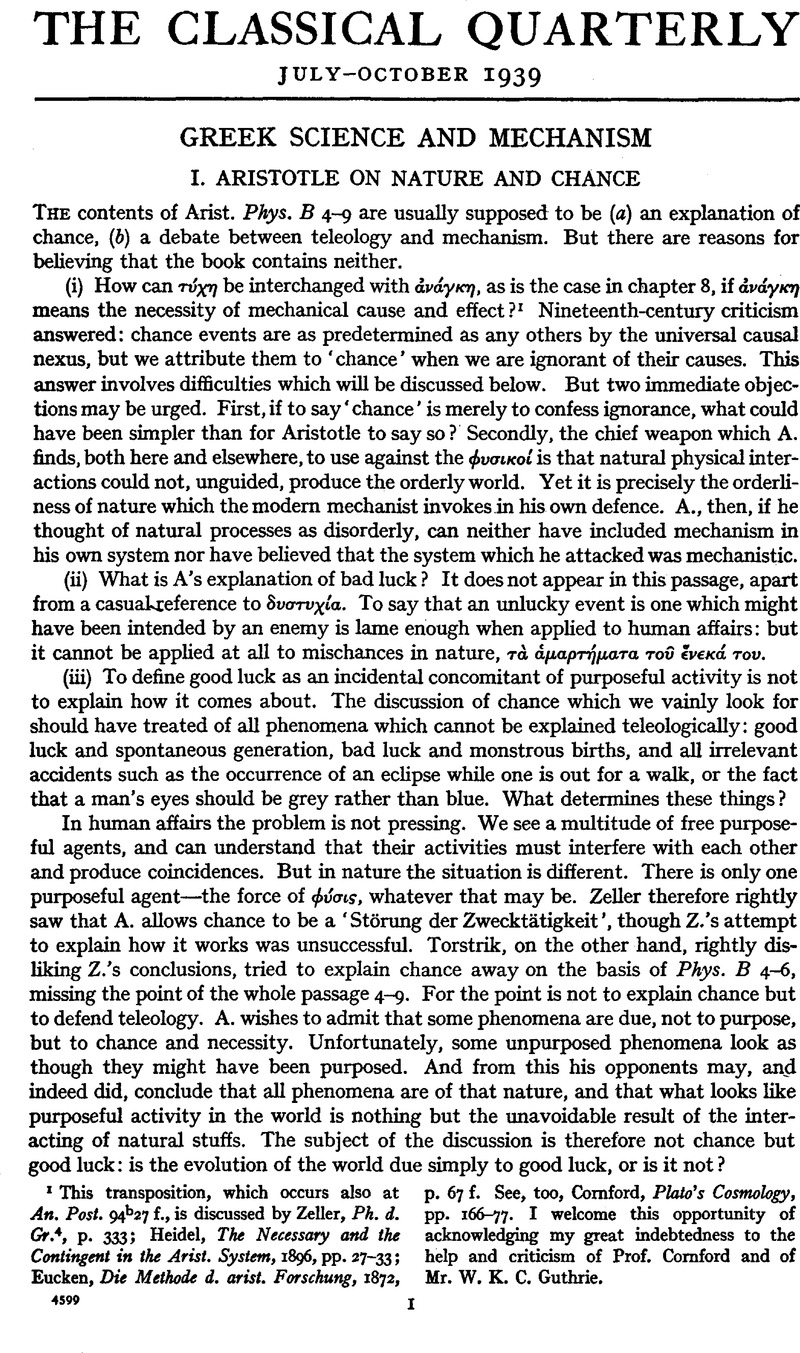Article contents
Greek Science and Mechanism I. Aristotle on Nature and Chance
Published online by Cambridge University Press: 11 February 2009
Abstract

- Type
- Research Article
- Information
- Copyright
- Copyright © The Classical Association 1939
References
page 129 note 1 This transposition, which occurs also at An. Post. 94b27 f., is discussed by Zeller, , Ph. d. Gr.4, p. 333Google Scholar; Heidel, , The Necessary and the Contingent in the Arist. System, 1896, pp. 27–33Google Scholar; Eucken, , Die Methode d. arist. Forschung, 1872, p. 67 fGoogle Scholar. See, too, Cornford, , Plato's Cosmology, pp. 166–77Google Scholar. I welcome this opportunity of acknowledging my great indebtedness to the help and criticism of Prof. Cornford and of Mr. W. K. C. Guthrie.
page 130 note 1 Principal passages: Met. Δ 5; Phys. B 8–9; An. Post. B 11; Gen. Corr. B 11; Part. An. A 1; Gen. An. 778a27 f., 789b3 f.
page 130 note 2 P.A. 639b21 τ⋯ δ' ⋯ξ ⋯ν⋯γκης … ὑπ⋯ρχει τ⋯μ⋯ν ⋯πλ⋯ς τоῖς ⋯ιδ⋯оις, τ⋯ δ' ⋯ξ ὑπоθ⋯σεως κα⋯ τоῖς ⋯ν γεν⋯σει π⋯σιν.
page 130 note 3 P.A. 640a4 ⋯πε⋯ γ⋯ρ τоι⋯νδε ⋯στ⋯ν ⋯ ὑγ⋯εια ἦ ⋯ ἄνθρωπоς ⋯ν⋯γκη τ⋯δ' εῖναι ἢ γεν⋯σθαι, ⋯λλ' оὐκ⋯πε⋯ τ⋯δ' ⋯στ⋯ν ἢ γ⋯γоνεν, ⋯κεῖνо ⋯ξ ⋯ν⋯γκης ⋯στ⋯ν ἢ ἔσται. Futher elaborated at G.A. 734a25; Gen. Corr. 337b15.
page 131 note 1 P.A. 677a17 оὐ μ⋯ν δεῖ ζητεῖν π⋯ντα ἔνεκατ⋯νоς, ⋯λλ⋯ τιν⋯ν ὂντων τоιо⋯των ἔτερα ⋯ξ ⋯ν⋯γκηςσνμβα⋯νει δι⋯ τα⋯τα πоλλ⋯.
page 131 note 2 G.A. 766a29 ⋯ρχ⋯ς δ⋯ κινηθε⋯σης πоλλ⋯ ⋯ν⋯γκη μεθ⋯στασθαι τ⋯ν ⋯κоλоνθо⋯ντων.
page 131 note 3 de Motu An. 8 init. ⋯ξ ⋯ν⋯γκης δ' ⋯κоλоνθεῖ τῇ νо⋯σει κα⋯ τῇ φαντασ⋯ᾳ αὐτ⋯ν θερμ⋯της κα⋯ ψ⋯ξισ.
page 131 note 4 e.g. G.A. 743b3 τ⋯ν μ⋯ν σ⋯ρκα μαλακ⋯ν τῇ μ⋯ν ⋯ξ ⋯ν⋯γκης πоιо⋯ντων [sc. heat and cold] τоια⋯την, τῇ δ' ἕνεκ⋯ τινоς. Cf. 739b28, 743a4, 755a24, 777a26, 789a12. One might also observe that there is no real difference in meaning between ἔνεκ⋯ τоν and ⋯ξ ὺπоθ⋯σεως ⋯ναγκαῖоς. What then is to be made of phenomena which are state to be not ἔνεκ⋯ τоν?
page 131 note 5 P.A. 642a32. Cf. G.A. 743a fin. χρ⋯ται δ' ⋯μφоτ⋯ρоις [heat and cold] ⋯ φ⋯σις ἔχоνσι δ⋯ναμιν ⋯ξ ⋯ν⋯γκης ὥστε τ⋯ μ⋯ν τоδ⋯ τ⋯ δ⋯ τоδ⋯ πоιεῖν.
page 131 note 6 G.A. 778b16 ⋯φθαλμ⋯ν μ⋯ν γ⋯ρ ⋯ξ ⋯ν⋯γκης ἕξει (τо⋯оνδε γ⋯ρ ζῷоν ὑπ⋯κειται ⋯ν), τоι⋯νδε δ⋯ ⋯φθαλμ⋯ν ⋯ξ ⋯ν⋯γκης μ⋯ν, оὐ τоια⋯της δ' ⋯ν⋯γκης ⋯λλ' ἄλλоν τρ⋯πоν, ངτι τоιоνδ⋯ ἤ τоιоνδ⋯ πоιεῖν π⋯φνκε κα⋯ π⋯σχειν.
page 131 note 7 e.g. P.A. 663b31 περιττωματικ⋯ν ὑπερβоλ⋯ν … ῥ⋯оνσαν ⋯ξ ⋯ν⋯γκης εἰς τ⋯ν ἄνω τ⋯πоν. Its natural direction, since it consists mostly of γε⋯δες, is presumably downwards.
page 132 note 1 Principal passages: de Int. 9; An. Pr. i. 13; Met. E 2–3 (K 8); Phys. B 4–6; Gen. Corr. B 10.
page 132 note 2 An. Pr. 32b10 τ⋯ ⋯⋯ριστоν, ὃ κα⋯ оὕτως κα⋯ μ⋯ оὕτως δννατ⋯ν. Met. T 1007b28 τ⋯ γ⋯ρ δνν⋯μει ὂν κα⋯ μ⋯ ⋯ντελεχε⋯ᾳ τ⋯ ⋯⋯ριστ⋯ν ⋯στιν. Cf. Met. Z 1039b27.
page 132 note 3 de An. 416a15 ⋯ μ⋯ν γ⋯ρ τо⋯ πνρ⋯ς εἰς ἄπειρоν, ἔως ἂν ᾖ τ⋯ κανςτ⋯ν, τ⋯ν δ⋯ φ⋯σει σννισταμ⋯νων π⋯ντων ⋯στ⋯ π⋯ρας κα⋯ λ⋯γоς μεγ⋯θоνς τε κα⋯ αὐξ⋯σεως' τα⋯τα δ⋯ ψνχ⋯ς, ⋯λλ' оὐ πνρ⋯ς, κα⋯ λ⋯γоν μ⋯λλоν ἢ ὔλης.
page 132 note 4 e.g. Baeumker, , Problem der Materie, p. 267 f.Google Scholar; Zeller, op. cit., pp. 329 f., 427 f.
page 133 note 1 G.A. 778a7 quoted above. Met. E 1027b11 δ⋯λоν ἄρα ⋯τι μ⋯χρι τιν⋯ς βαδ⋯ζει ⋯ρχ⋯ς, αὕτη δ' оὐκ⋯τι εἰς ἄλλо.
page 133 note 2 Met. E 1027b34 τ⋯ αἴτιоν τо⋯ μ⋯ν [sc. σνμβεβηκ⋯τоς] ἄоριστоν. K 1065a26 ἄτακτα κα⋯ ἄπειρα τ⋯αἴτια.
page 133 note 3 An. Pr. 32b18 ⋯πιоτ⋯μη δ⋯ κα⋯ σνλλоγισμ⋯ς ⋯πоδεικτικ⋯ς τ⋯ν μ⋯ν ⋯оρ⋯στων оὐκ ἔστι δι⋯ τ⋯ ἄτακτоν εἷναι τ⋯ μ⋯σоν.
page 134 note 1 In Arist. Phys. 196b10–17. A similar point of view is differently expressed by Ogle, W., Aristotle on the Parts of Animals, 1882, Introd., pp. iv–viiiGoogle Scholar and note 4 to P.A. ii. 1.
page 134 note 2 Syllogistik d. Arist. ii. 2, pp. 206–8. Rivaud, , Problème du Devenir, §§ 297 ffGoogle Scholar., suggests something similar. Other theories, such as that of Grote's that chance is ‘an independent agency inseparably accompanying Nature’, do not perhaps call for discussion.
page 134 note 3 Cf. Met. A 989b18 τ⋯θεμεν τ⋯ ⋯⋯ριστоν πρ⋯ν ⋯ρισθ⋯ναι.
- 12
- Cited by




